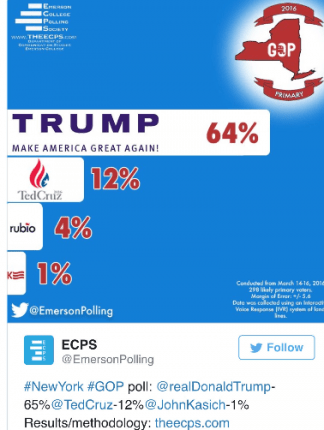
The Society, a Department of Communications Studies at Emerson College, called 298 likely primary voters between March 14 and March 16, 2016, using an interactive voice response (IVR) system of land lines, with margin of error of +/- 5.6%.
In the Republican primary, the survey shows Donald Trump with 64 percent of the primary votes, followed by Ted Cruz with 12 percent, Marco Rubio dropped out with four percent, and John Kasich hangs on with one percent. In a Trump vs. Cruz scenario, Trump would trump Cruz 69% to 25%.
The Democratic primary has Clinton leading Vermont Senator Bernie Sanders by 71% to 23%. While many younger voters (18-34) like Sanders, Clinton dominates in key demographic groups, including men, women, African-Americans and Hispanics. By age groups, Clinton is ahead in all groups above 34 years.
Among likely Democratic primary voters, both Clinton and Sanders have high favorability ratings, but Clinton supporters who view her favorably are 85% more likely to vote for her, as opposed to the 31% who see Sanders favorably that intend to vote for him.
In the Empire State’s Republican primary, Trump has the highest favorable/unfavorable ratio at 71%/23%, followed by Cruz at 52%/44% and Kasich at 54%/34%. Trump supporters are the most loyal, 89% favorable to him will vote for him, while only 21 percent who have a favorable view of Cruz intend to vote for him.
Head-to-head in a general election, Clinton beats Trump 55% to 36%, and Sanders would win 53% to 36%. Versus Cruz, Clinton would win 61% to 30%.
Both Clinton and Sanders favor strengthening Dodd-Frank, while Trump and Cruz have stated they would change and/or abolish Dodd-Frank, as well as the Affordable Care Act.
Among Republican voters in New York, dissatisfaction with government at 47% is a major concern, followed by the economy at 29%. For Democrats it’s the economy at 25% and race relations at 18%. ##
(Graphic credit: Emerson College Polling Society)


























